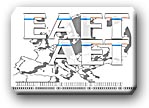Conférence
pour une
infrastructure
terminologique en Europe
Conferencia para una infraestructura terminol�gica en Europa
Conference
for a terminology
infrastructure in Europe
Paris,
le 13-14-15/03/2000
Maison de l'UNESCO, Salle XI
7, place de Fontenoy
75007 PARIS
|
.Gerhard
Budin
.
|
Cooperation in terminology basic research, academic
R&D and terminology teaching and training
Basic research as well as teaching and training are major elements of>terminological activities in Europe and all over the world. Scientific research is a pre-requisite for commercial products and practical applications of tools, teaching and training is essential for a professionalization of terminology in different corporate environments.
A European terminology infrastructure (as much as the international one) cannot do without research and training. Increasingly, coordination and cooperation is needed in these areas.
The International Institute for Terminology Research was founded in 1989. It has about 100 members, exclusively terminology researchers and teachers, in more than 40 countries of the world. Its mission and purpose is to carry out basic research in all fields of terminology, to develop new curricula for terminology teaching and training, and to carry out research projects.
Since 1989 the scholarly journal 'Terminology Science and Research' has been published (twice a year). The Institute has organised numerous scholarly workshops on specific issues of terminology theory, several major congresses and symposia, as well as workshops on didactic issues of terminology teaching.
For more than 10 years, the Institute has been carrying out the International Terminology Summer School, with participants from all over the world and covering a wide spectrum of topics in terminology.
Research projects have been funded by national ministries of science and research and have covered topics such as terminological knowledge engineering in the field of ethnology, knowledge modelling in the field of environmental protection, setting up a terminology knowledge base for biology, etc.
In the framework of the next European LSP congress to be held in Vaasa, August 2001, the Institute will carry out a special workshop on systematically comparing different terminology theories as they have developed in different cultural environments and scholarly traditions.

